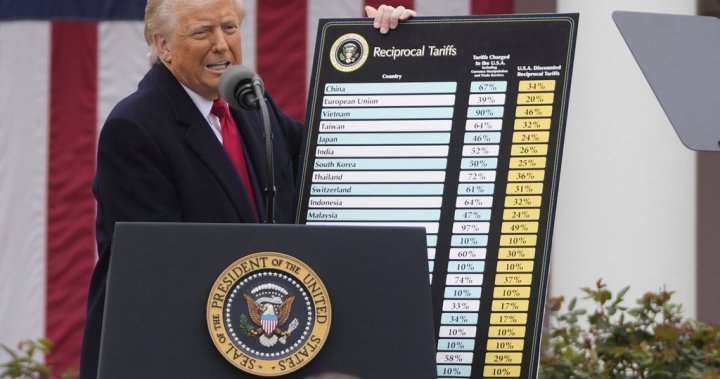On what American President Donald Trump called the “Oslobođenja Day”, the American leader has imposed his so-called “reciprocal” tariff policy in dozens of foreign nations.
While his announcement, Trump also called the historical law called the 1930 Smoot Hawlei’s Taliff ACT. Years, claimed to preserve the United States of great depression if not eliminated.
Checking facts quickly hurried whether the law increased or depressed the American economy, while social media flooded quickly with clips from the classical film Ferris Bueller Day, The composition for protagonist in teaching in learning about the act, with its teacher guilty, followed by American President Herbert Hoover’s act for making a great depression worse.
The history professor of the University of Manitoba George Buri does not agree with that claim, stating that its effects were quite insignificant.
Light to spill on the famous film scene, Buri reveals that Ben Stein, the actor who played a bouquel, was a free market economist and a conservative before he turned a comedian. During the production of the film, he was actually told that the director gives a boring lesson.
Still from the 1986 movie. Year ‘Ferris Bueller’s Day Off’.
Gettiimages
Buri is interesting that he gave it a lecture, because it is a direct reflection of what he preached during the 1980s in the time of Thatcher and Reagan, time when key policy and government intervention was seen as a thing of the past. The bury believed that it was a lack of demand that caused great depression, not tariffs.

They get news about weekly money
Get professional insights, questions and questions, housing, inflation and personal information and personal financial information that comes to you every Saturday.
“Like these politicians, they are essentially essentially discussed by improper economic policies that are preferred to return to open markets, Laissez Faire and Free Trade. Basically they want to say that the tariffs are always bad.”
“In the 80s, this new theory is what really caused depression was not Laissez Fair, so it had to be Tariffs Smoot Hawlei”
New regulations and capital investments from the then President Franklin D. Roosevelt included banks and establishing social protection systems, helping great depression.
Meanwhile, Hoover’s tariffs saw them as a failure to improve the economy. Since there was such low demand in various sectors, tariffs intended for encouraging Americans to buy cheaper domestic goods became meaningless because prices were already so low. From 1928. until 1933. year, the price of wheat wheat fell from 1.29 to 34 cents.
Although they have created difficult conditions in Canada, the broader effects of the great depression were far greater than the Smoot Hawlei tariffs.
Ottawa even tried to bridge the gap using reciprocal tariffs in response, but they were eventually unsuccessful. Buri says that it was an American recovery that helped the integrated system of natural resources, while war production in late 1930s quickly increased the demand for materials and finished the financial crisis of Canada.
Although Tariffs seemed to play an insignificant role during depression, they were sparks, which ignited the time frame of the Northern Nations.
After the United Kingdom interrupted their preferential exchange with Imperial Colonies, the Upper and Lower Canada, as well as Novi Scotch and Novi Brunswick, began trading their southern neighbors. However, these relations have become complicated when the United States conducted tariffs in 1866. year, after Britain provided support to the cotton and sugar confedium in the American Civil War.
“It’s literally what Canada gave birth,” Buri said.
“IN 1866 America Ends Reciprocity, and the very Next year, New Brunswick and Nova Scotia Decide to form modern-day canada Based on this new Notion of, ‘We Can’t Trade With The Us, With Why Don’t WE Trade With Each Other and Form A Larger Entity? ‘”
Once the country was formed, the borri points out that the expansion of East-West is encouraged by the tariffs implemented by John A. MacDonald, forcing Canadians to trade above 49in Parallel and protect a new nation from American influence.
Although free trade motivator for economic nationalism early, Buri says that the movement reappeared in the 1980s, because the American corporations bite the Northness of Minorly, many smaller economies as integrated with their financial system of the South Neighborhood.
Although tariffs had very different effects and canadians and Americans, both nations were filled with tariffs and developments. Although burrows do not agree with Trump methods behind tariffs, historian understands its reasoning.
“There is a real problem with the American economy,” he said.
“This is not completely accidental. It is an attempt to reverse a few decades of the fall of American production economy and America rely on Wall Street and the American dollar, which we have seen in 2008. could be a prescription for a disaster.”
“I think America is trying to deal with some very real problems with your economy. Whether or not it will do it.”
& Copi 2025 Global News, Division Corus Entertainment Inc.











